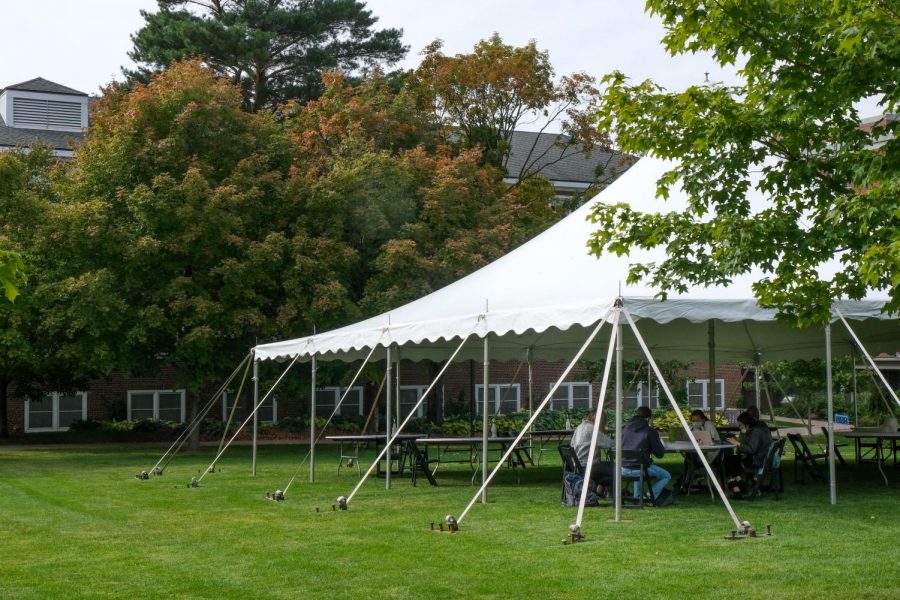EPAG adjusts grading policy, students react
September 17, 2020
For the second time in as many semesters, Macalester’s Education Policy and Governance Committee (EPAG) announced it would temporarily amend the college’s grading policy in response to the COVID-19 pandemic.
In past years, students were allowed to take one class S/SD/NC (satisfactory, passing, no credit) — colloquially “pass/fail” — though the course would not count toward a major, concentration or minor. Classes taken S/SD/NC could meet distribution and language requirements if a student received an “S.”
As instruction transitioned online in March of 2020 the policy was amended: students could take any or all courses pass/fail, including courses that would fulfill major, concentration, minor or distribution requirements.
“We [were] reacting to an emergency, and to a sudden switch to a very unknown environment,” EPAG committee chair James Heyman said. “In the face of that, we wanted to give students and faculty the maximum amount of flexibility.”
Once the college announced module one instruction would be online for all off-campus students, EPAG met to discuss grading policy for the upcoming semester.
“EPAG did discuss this issue early in the summer, and we decided to return to the traditional policy,” Heyman said. “At the time things looked quite different. This fall, we’re reacting to an evolving situation. But still it’s one that we now have some experience with.”
The committee met on Aug. 27 and identified three possible grading options. The first option was Macalester’s traditional grading policy. The second option was the policy instituted in spring semester, and the third option was a combination.
“Many of us [on EPAG] found both of these to be problematic,” Heyman said. “We didn’t have a consensus on the committee to go forward with either one. The third option emerged from our discussion.”
Under option three, students are free to take as many courses S/SD/NC as they want. However, while courses taken with this designation can fulfill general distribution requirements, they cannot be included on major, minor or concentration plans without specific departmental approval.
EPAG surveyed department chairs and program directors, asking them to rank the three options “most positive,” “intermediate” and “most negative.” Of the 34 that responded, a return to the pre-pandemic grading policy was favored by only six. Option two was favored by 15 respondents, though 13 ranked it “most negative.”
Option three received the most “most positive” or “intermediate” rankings, with 14 and 18 votes, respectively.
“We [EPAG] had a really strong sense of the time pressure that we were under because we were making a policy for a term that was already starting,” Heyman said. “We also knew that this would be a policy change that we were imposing on departments and programs at the last moment.”
EPAG solicited no student input beyond the committee’s student representative. Heyman cited time constraints and suggested there may be opportunity for student input in future EPAG grading policy decisions.
“The main student input was the original letter that started our discussion,” Heyman said. “Since these decisions, we received several letters from students, all echoing essentially the same concerns that were raised in the original letter.”
Dalton Greene ’22 sent the original letter to President Suzanne Rivera on Aug. 19. Rivera forwarded that email on to EPAG, which prompted the committee to reevaluate the grading policy for fall semester.
“In my email, I really wanted to make it clear that students learning remotely are in an entirely new and often challenging position,” Greene wrote in an email to The Mac Weekly. “While it sounds obvious, I just felt it was important to explicitly name that this semester is very different for students, and as such, we should take a different approach to student evaluation.”
Greene’s experience as chapter president for Macalester College Questbridge — a non-profit that connects low-income students with colleges and awards scholarships — informed his email.
“I feel very connected with the first-gen/low-income [FGLI] community on campus, and I saw firsthand how the updated grading policy alleviated some undue stress on my FGLI peers in the spring,” Greene wrote. “Because students from underrepresented backgrounds most acutely feel the pressures of learning from home, allowing students to designate the S/SD/NC option is one step we can take toward making a Macalester education more equitable for all.”
As fall semester approached and students hadn’t received any information on the college’s grading policy, Greene became curious.
“I just intended to see where the administration was at in the process,” Greene wrote. “My email was initially a way to find out whether or not this was on their radar, and if so, if President Rivera could shed any light on the matter.
“After President Rivera forwarded my email to EPAG, I didn’t receive any communication until the announcement about the new policy went out to all students,” Greene continued.
Once the policy was announced, Greene’s initial reactions were mixed. Though he was grateful they amended the policy at all, he was disappointed they stopped short of re-adopting the policy implemented in late spring.
“It feels very patronizing to be told that we, as students, might not fully recognize the implications of S/SD/NC grading,” Greene wrote. “It’s like being told we aren’t full agents in our own education… while it was certainly a step in the right direction, I’d like to see whether student input may prompt a change to the policy that more closely resembles what was done in the spring.”
“One concern I see expressed by students is asking for more involvement,” Heyman said. “That was something raised in the recent letters which didn’t appear in the original letter.”
Adele Welch ’21 was among the students that emailed EPAG in response to the grading policy. As an educational studies major, Welch carefully considered the shortcomings of the current system.
“I think many people who are against a pass/fail option, or even a universal pass system, are worried about students lacking commitment,” Welch said. “Commitment, to me, is built through relationship building between teachers and students.”
Welch admits that she has never taken a class with the S/SD/NC designation, but feels strongly about it regardless. The lack of student input was, for Welch, as concerning as the ultimate determination.
“I was disappointed at the lack of student input in the decision and the way that the committee referred to the couple people that they consulted as ‘the community,’” Welch said. “Students are arguably the most affected by the grading policy, besides professors, and to not include a really broad student voice in that decision was disheartening to me.”
Charlee Gorham ’21 voiced their concerns in the wake of the grading policy announcement in an email to the committee as well. They took at least one of their classes pass/fail during the Spring 2020 semester, including one for their major, and would’ve liked the opportunity to do so again this fall.
“It wasn’t that surprising but it was also incredibly disappointing,” Gorham said. “Me and everybody else [are] now in a million times more stress, emotional, mental, psychological, financial stress, than last semester.”
Gorham expressed disappointment with the lack of student input during the decision-making process. They were also frustrated with how the committee seemed to overlook students’ mental health, communicating concerns spanning further than just the effects of COVID-19 on students.
“I would have liked it if they let students decide for themselves because we are adults, and we can make this decision for ourselves,” they said. “I’m not gonna go to grad school; we’re not all going to grad school.”
Gorham admitted that EPAG’s concerns about decreased student engagement were not unfounded. They acknowledge that engagement decreased outside of class last semester, but their contributions during meeting times and effort toward group projects remained.
“That’s kind of the point,” Gorham said. “I think that taking a class pass/fail took the stress off of me to feel like I had to be perfect. Education should not be as focused on grades as it is like learning how to think and be a helpful member of society. The emphasis on getting As is so stressful on top of all of this insane mess of a world that we have right now.”














